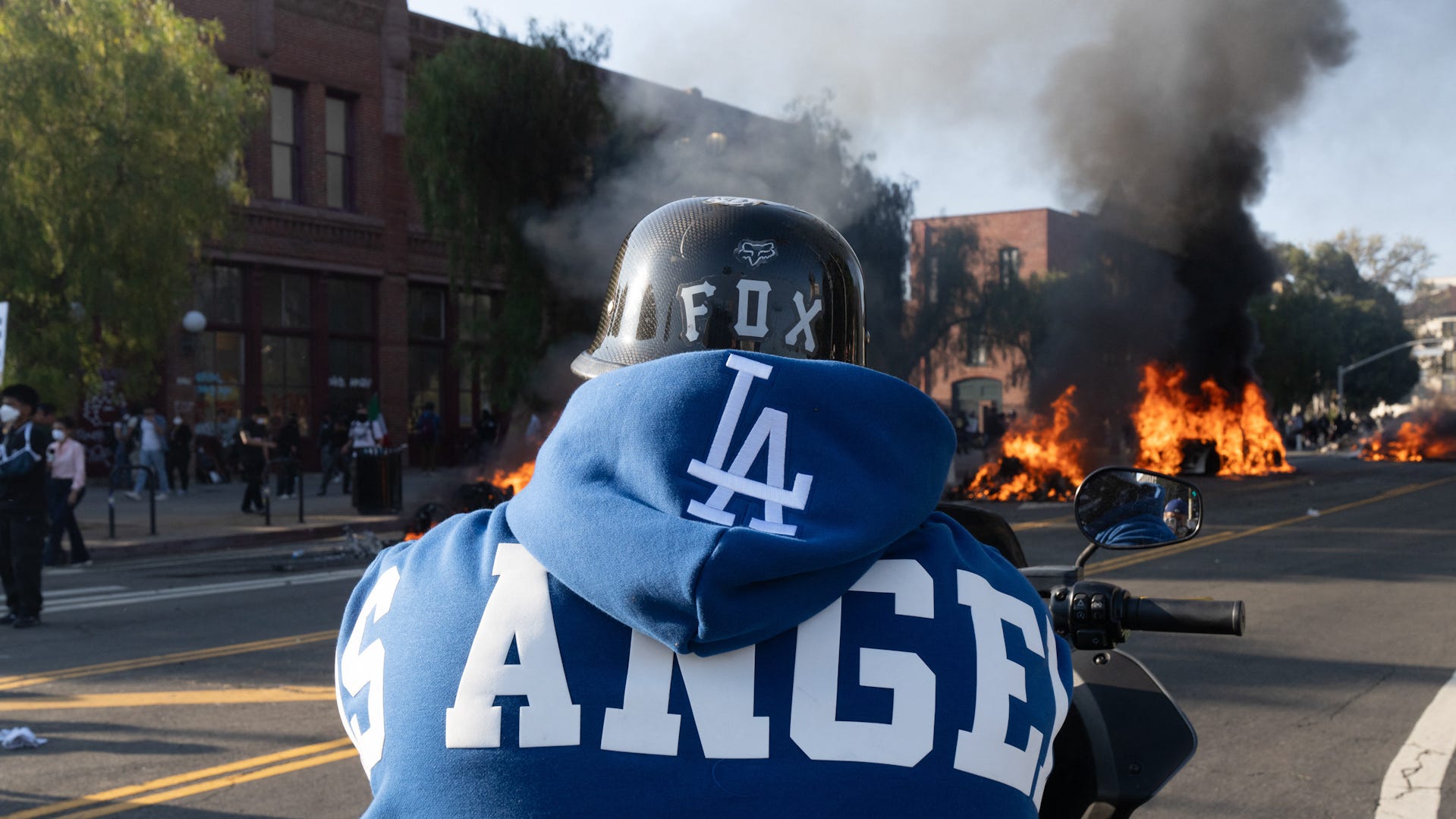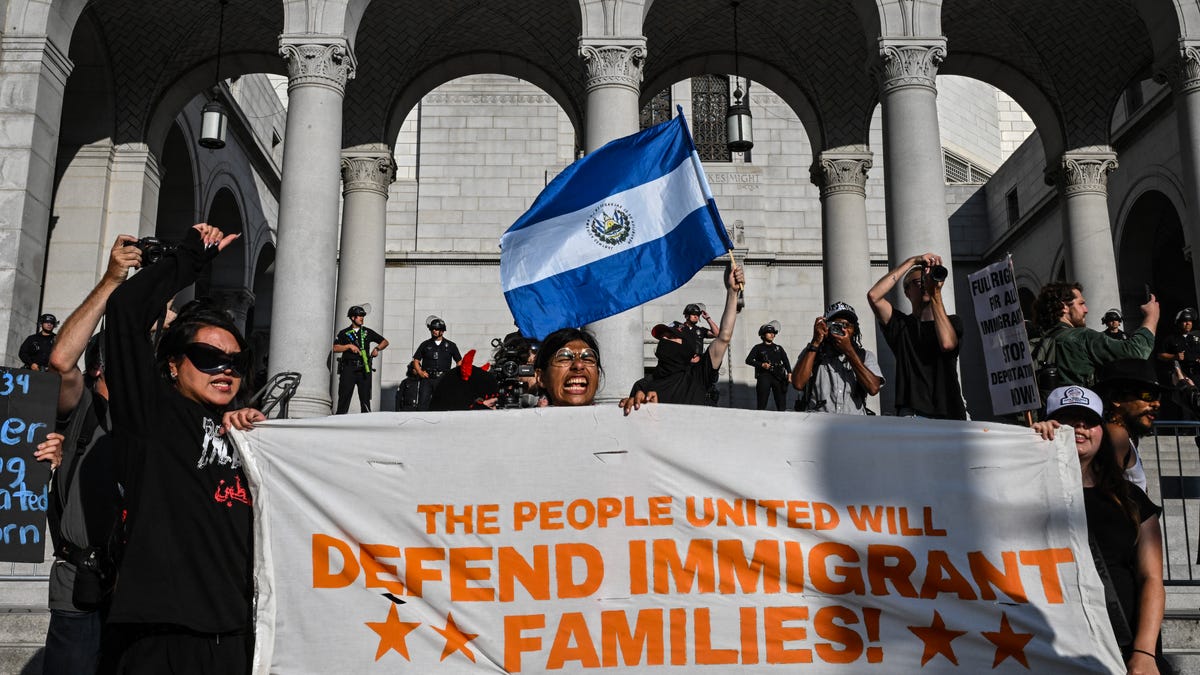
See how Los Angeles protests intensified over one weekend
What started as a small protest over immigration raids on Friday ballooned into large demonstrations throughout the weekend. Here’s what happened.
From gas stations in Phoenix to construction sites in Tallahassee, workplace raids crisscrossing the nation have alarmed businesses that suddenly find themselves in the crosshairs of the Trump administration’s immigration crackdown.
Farmworkers hid in fields from federal immigration agents in California. Dozens of people were hauled off in buses when Immigration and Customs Enforcement raided a meat-processing plant in Omaha. In Los Angeles, sudden sweeps of day laborers in Home Depot parking lots and workers at car washes and in the garment industry ignited protests that have spread to cities across the country.
The administration’s push to detain record numbers of undocumented immigrants has set off “a whole new wave of panic,” said Chris Thomas, a partner at the Holland & Hart law firm who represents employers in immigration cases.
The sharp uptick in immigration enforcement activities is a departure for federal authorities who usually avoid going after businesses.
Now, employers are worried that the escalating enforcement campaign will not only cripple their businesses but could lead to civil and criminal exposure, even when they have rigorous hiring processes, Thomas said.
Tensions are running high, particularly in the construction, hospitality and food processing, but he expects the immigration crackdown will soon rattle businesses in other industries.
Already, major public companies have warned investors the immigration crackdown could affect their businesses that rely on a migrant workforce.
Meatpacker Smithfield warned in a securities filing in March: “Increased enforcement efforts with respect to existing immigration laws by governmental authorities may disrupt a portion of our workforce or our operations. There can be no assurance that these activities or consequences will not adversely affect our business, financial condition or results of operations in the future.”
“We have never seen anything like this,” Thomas said. “They have just gotten started and there is so much more to come. Thus far we have seen raids on a smaller scale. But they are moving into the next stage now where they will have larger-scale worksite enforcement operations at bigger companies.”
President Donald Trump swept into office on a pledge to crack down on illegal immigration. It is estimated that there are more than 8 million undocumented immigrants working in the United States.
White House Deputy Chief of Staff Stephen Miller told Fox News’ Sean Hannity in May that the goal for ICE was a “minimum” of 3,000 arrests a day. “And President Trump is going to keep pushing to get that number up higher each and every single day,” Miller said.
White House border czar Tom Homan warned this week that “worksite enforcement operations are going to massively expand.”
In a Truth Social post Thursday, Trump acknowledged that the crackdown was hurting American employers. “Our great Farmers and people in the Hotel and Leisure business have been stating that our very aggressive policy on immigration is taking very good, long time workers away from them, with those jobs being almost impossible to replace,” Trump wrote.
At the White House, he told reporters he would issue an order to help address worker shortages brought on by raids of farm and hotel workers.
The president’s words have not reassured employers, said Shanon Stevenson, a partner who co-chairs the national immigration practice at the Fisher & Phillips law firm.
Calls from worried clients have increased 75% since last week.
“Employers have to respond to the reality they are seeing. This is a massive increase in worksite enforcement,” Stevenson said. “Hearing comments that specific industries won’t be targeted when the employers in these industries are facing raids, and did yesterday, it’s a little bit hard to swallow.”
Businesses are collateral damage as the explosion of immigration enforcement worsens staffing issues for businesses already facing worker shortages, according to Amy Peck, a partner with the Jackson Lewis law firm who represents employers in immigration matters.
“We have employers who are not able to open their businesses because workers aren’t showing up. Restaurants with multiple locations are having to consolidate or not open certain locations because of a lack of workers or they close early or close the lunch shift because there aren’t enough workers,” Peck said. “I have manufacturers who are going down from three shifts to two because of the lack of workers. It’s really putting a squeeze on employers.”
In Idaho, businesses that were already shortstaffed have lost even more employees who are afraid to show up for work, said Alycia Moss, who chairs the immigration practice group at the Hawley Troxell Ennis & Hawley law firm. Hispanic and Latino businesses have been particularly hard hit, Moss said.
“Most of the businesses I assist and speak with could not find enough workers before this increase and now some have told me they may have to scale back or close. I have one client who had to close his business,” she said.









